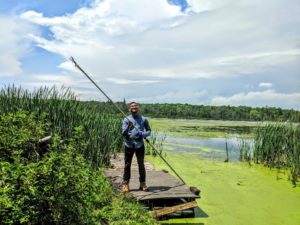Taufiq Safdar did a BES in 2018 and an Advanced Diploma in Environmental Engineering Technology / Environmental Technology in 2020.
Where do you work now and what do you do?
Tell us your work journey after the degree: what went well, what was challenging?
I won't sugar coat it; post-graduation was not a stellar time in terms of finding meaningful work. Although I secured a few interviews, and made positive impressions, the common denominator throughout all these experiences was that the hiring team had decided to go with someone with more experience. However, this served as a very humbling moment for reflection and crystallized my next steps towards getting to where I wanted to be in my professional life.
In the end I was fortunate enough to secure a part-time opportunity as an Outreach Assistant at LeadingGREEN Training & Consulting, an organization which operates workshops for LEED certification. I worked in this role while pursuing a diploma in Environmental Technology at Centennial College. In both situations my experiences from York University helped immeasurably - particularly with managing the workload at college and with communicating with clients in the Outreach Assistant position. Following that, I began working as an Environmental Assistant at the Ministry of the Environment, Conservation and Parks in 2019. This opportunity really enlightened me to the breadth and scope of work undertaken in the environmental sector, be it in enforcing environmental regulations, performing sampling, and lab work. I leveraged my skills in GIS to compliment some of the work I was tasked with while at the MECP, and it has consistently been one of the skills which has opened up many doors for me.
How did you use what you learned; when did you feel - "why didnt they teach me about this"?
With the benefit of hindsight, I would say that a greater emphasis on preparing entry into the workforce would have been beneficial for myself and others. Things like how to structure your resume, what to include in the cover letter, and how to sell your skills effectively during the interview. That was a major lesson to learn after graduation, being able to sell your skills to prospective employers matters more than the skills you don't have.
Thinking back to when you were in high school, what made you want to get into this? How does what you are doing match, and differ, from what you thought?
Beyond a doubt the idea of contributing towards a greater good, making a meaningful change in people's lives, and helping build more robust communities is what drove me to pursue a BES. I am happy to say I can contribute to all these areas in my current role as a Compliance Specialist Intern at Halton Region. Although, I can certainly say that this isn't where I imagined I was going to be today, because I didn't really truly have an idea how I would apply what I learned in the workforce. That's why I think it's so important to find mentorship while you're in university or college. Be it mentorship provided by a professor, friend, colleague, or someone you admire in your field of interest. These people will be able to provide insight into opportunities and help you hone your skills better than Google ever can.
Any other advice for people thinking of an undergrad environmental degree?
Don't get discouraged! There might be lots of losses and rejection after graduation, but it is paramount that you stay focused and driven towards getting to the end goal, whatever that may be for you. Keep a good support system around you that uplifts you when you're feeling low, provides feedback that helps you improve, and is brutally honest when you mess up.
And don't be scared to invest in yourself. This can be as simple as pursuing a post-graduate degree or something as challenging as starting your own business. If you're diligent, level-headed, and driven you can make it work for you and get you where you need to go. Just be very aware of what you need to put in to get back what you want out of that investment.


